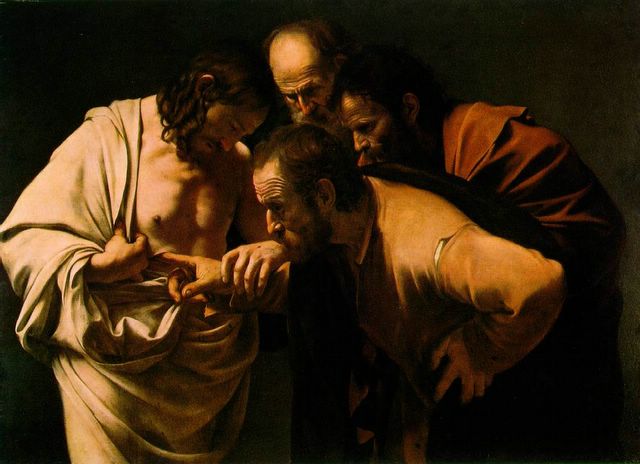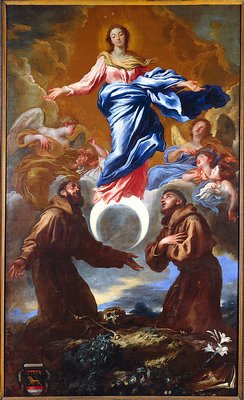
In my previous post, I gave a brief synopsis of the Franciscan role in the propagation and defense of the pious belief of the Immaculate Conception of the Blessed Virgin Mary. Since today is the feast of Our Lady of Guadalupe, it should be mentioned that a Franciscan "would play a very crucial role in... [the] story" of her apparitions at Tepeyac to St. Juan Diego (quoted from
Our Lady of Guadalupe; many of the following details will also be from this article).
Our Lady made her first apparition on 9 December 1531 (the 9th would become the feast day for St. Juan Diego). She requested that the saint, an Indian who had embraced Christianity, "go to the city of Mexico and to the palace of the bishop who resides there, to tell him that I have sent thee and that I wish a temple to be raised to me in this place. Thou shalt report what thou hast seen and heard..."
St. Juan Diego went immediately on the mission Our Lady sent him on. The bishop of Mexico at the time of the apparitions was Don Juan de Zumárraga, a Franciscan who had been bishop since 1527. He was a man who was "already intimate with the Mother of God, [and] he secretly asked her to acknowledge her reception of his prayer by sending him roses from Castile." The bishop was praying that a conflict between the Indian natives and their Spanish conquerors would be avoided, since tensions between the two sides had been growing ever since the fall of the Aztec empire.
When St. Juan Diego arrived in Mexico City, he told Bishop Zumárraga everything that had happened to him earlier that day. The bishop questioned the saint at length. Though he was "not the type of man to dismiss such matters lightly, [h]e would need more time to check out the Indian's character." When the bishop was finished with his questions, Juan Diego took his leave of the Franciscan, "[d]eeply saddened by the obvious skepticism of the illustrious bishop." On his way from the bishop's residence, Our Lady appeared to him a second time, and reassuring him, she asked him to go back to bishop to make her request a second time."
The next day, St. Juan Diego went back to the bishop's residence a second time. He waited for three hours, but finally got to see him. Bishop Zumárraga asked for a sign before Our Lady's request that church be built in her honor at the site of the apparitions. When Juan Diego asked what kind of sign he should ask for, the bishop said, "Let the Lady herself decide it." When Our Lady appeared to him a third time, he asked for the sign. She promised to give it, and asked that Juan Diego return to Tepeyac the next day.
The saint did not return. He spent the day taking care of his uncle, Juan Bernardino, who was close to death. Though he wanted to obey his Lady's command, he thought that "the Holy Virgin would understand why he was unable to keep his appointment that afternoon as he had promised."
The next morning, the 12th of December, Juan Bernardino sent his nephew to find a priest, so he could confess his sins and be anointed. Juan Diego went on his way, and in order to get a priest, he had to pass near Tepeyac. He knew that he might see his Lady if he continued on the path, so he tried to go around. The Blessed Mother appeared to him nonetheless. She assured him that his uncle wasn't going to die that day, and ordered him to climb the hill of Tepeyac. He would find the sign that Bishop Zumárraga had asked for there. When he reached the summit, Juan Diego found "[some] most exquisite flowers, including Castilian roses, blossoming in the frozen soil.... [H]e carefully gathered as many of them as he could fit into his outstretched tilma and brought them down to show to his Queen. She then took the flowers and with her own hands rearranged them, as only a woman can, saying as she did so, 'My little son, these varied flowers are the sign which you are to take to the Bishop. Tell him in my name that in them he will recognize my will and that he must fulfill it.'"
Juan Diego went back to Mexico City, and after being delayed the servants of the bishop, he was granted a third audience with Bishop Zumárraga. He told the bishop and his guests what had taken place that morning, and when he was finished, Juan Diego showed what was inside his tilma. The flowers "cascaded softly to the floor before the startled dignitaries, and perfumed the room with a heavenly aroma. [Bishop] Zumarraga jumped to his feet and stared at the roses, momentarily speechless; his prayer for peace had been answered! Then, as he lifted his eyes from the prodigy on the floor, there suddenly appeared on the Indian's tilma [the] image of the Blessed Virgin Mary." As the image appeared, the bishop fell to his knees, and proclaimed, "Es la Immaculada!" which means, "It is the Immaculate One!" (taken from
Saint Juan Diego and the Tilma of Our Lady of Guadalupe). The Franciscan formation of Bishop Zumárraga had obviously influenced him to use this title for Our Lady. She would use the same title to refer to herself when she appeared at Lourdes three hundred and twenty-seven years later.
Our Lady of Guadalupe, Queen of the Americas, pray for us!
















